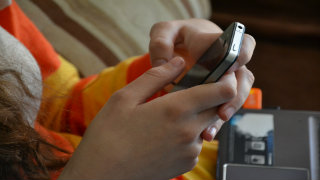Social media enables people to interact with each other by both sharing and consuming information over the internet.
See Group Handbook B1: Availability, contact and communication
- What is social media?
- Why use social media?
- Representing us on social media
- Social media and your role
- Keeping your data safe online
- Our social media rules
- Need support?
What is social media?
Social media enables people to interact with each other by both sharing and consuming information over the internet.
Why use social media?
Social media can help inspire people to take action.
By using social media we can:
- provide and share quality information
- thank supporters and members
- increase the number of people that join us
- raise awareness of everything we achieve
All interactions, no matter how big or small, help us connect with more people and support each other. Get involved in social media so that together we can stop MS.
Representing us on social media
Your personal social media account represents us if you identify yourself as an MS Society volunteer anywhere in your biography, posts or comments on others’ posts.
Your group account must include your group name and our official social media profile image, and all posts and comments on others’ posts must follow our social media rules.
- Access our interactive Social Media Toolkit
- Download a Social media profile image
- Read our Social Media Guide
Social media and your role
If you are responsible for maintaining your group social media account, your Group Coordinator must ensure you are listed as a Communications Volunteer on our volunteer database. This is so we know who to contact about your account.
Whenever your group recruits a new volunteer, or an existing volunteer changes role, your Group Coordinator must contact the Supporter Care Team to update our database.
- Find out more about our Communications Volunteers
Keeping your personal information safe online
We strongly recommend that you do not share your personal information – including home addresses and phone numbers – anywhere online. This includes on MS Society website pages, group and personal social media accounts, and PDF versions of your newsletters.
Your personal online security is your responsibility.
Find out more about our Data protection basics
Our social media rules
Whenever you use a group or personal account to represent us on social media, you must follow these rules:
If you set up a group account, your description, biography or ‘about us’ section must state that the account is run by a group of MS Society volunteers and that ‘Views are our own’.
When using your personal account, you must add the statement ‘Views are my own’ at the end of your biography.
All content you post must meet our data protection requirements; you must obtain written consent before posting any form of personal information, including images.
Comments, messages and mentions will need to be monitored and moderated each day. Respond to each interaction (especially negative comments) with sensitivity and care. Escalate any remarks that are threatening, aggressive or rude to our Digital and Content Team.
You must not:
Post uncorroborated facts, stories or views of the MS Society.
Share messages that could be considered as defamation towards the MS Society, any member of staff or volunteer.
Post content, messages or links that could be considered inappropriate or illegal, including content that might offend someone on the basis of race, religion, age, sex, politics, nationality, disability, sexual orientation, gender or any other characteristic protected by law.
Engage in or encourage any illegal or criminal activities.
Post, share or forward spam, junk or phishing scams.
Need support?
Creating a new social media account
Use the links on our IT Support page to help you set up a new social media account.
- Go to our IT Support page
Digital and Content Team
Escalate any social media remarks that are threatening, aggressive or rude to the Digital and Content Team.
- Get contact details for our Digital and Content Team.
Back to Contact methods



